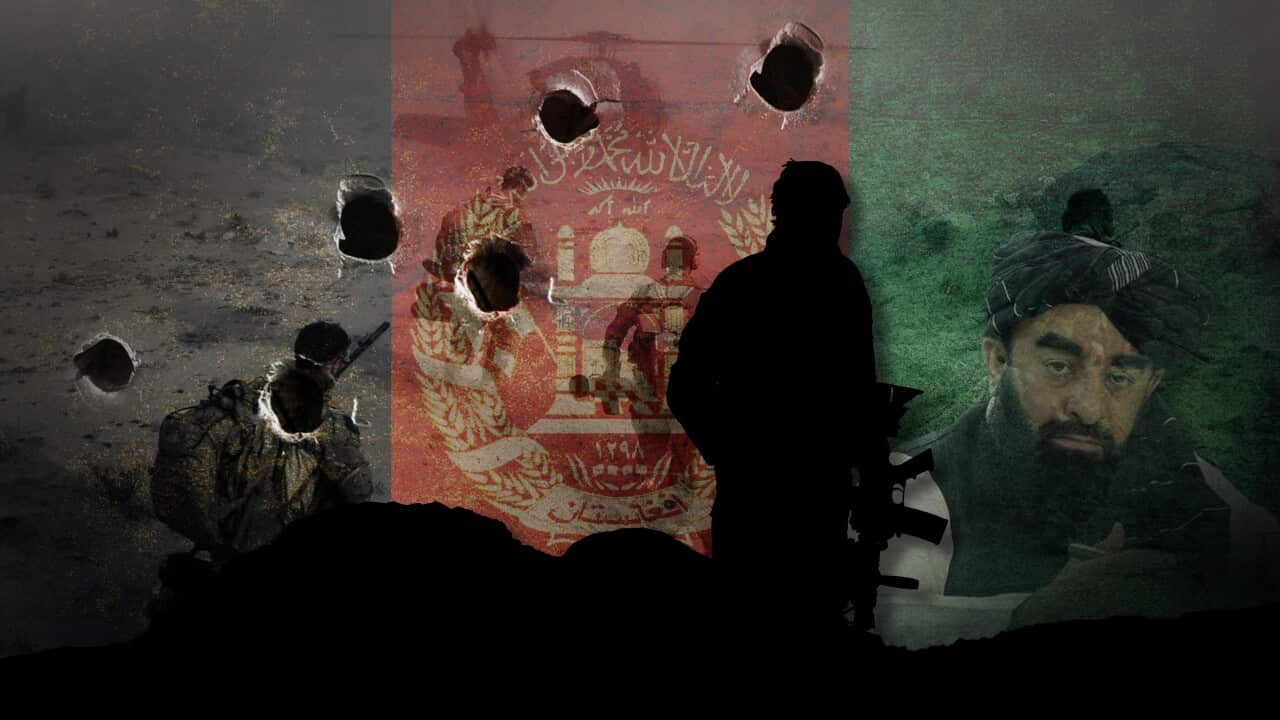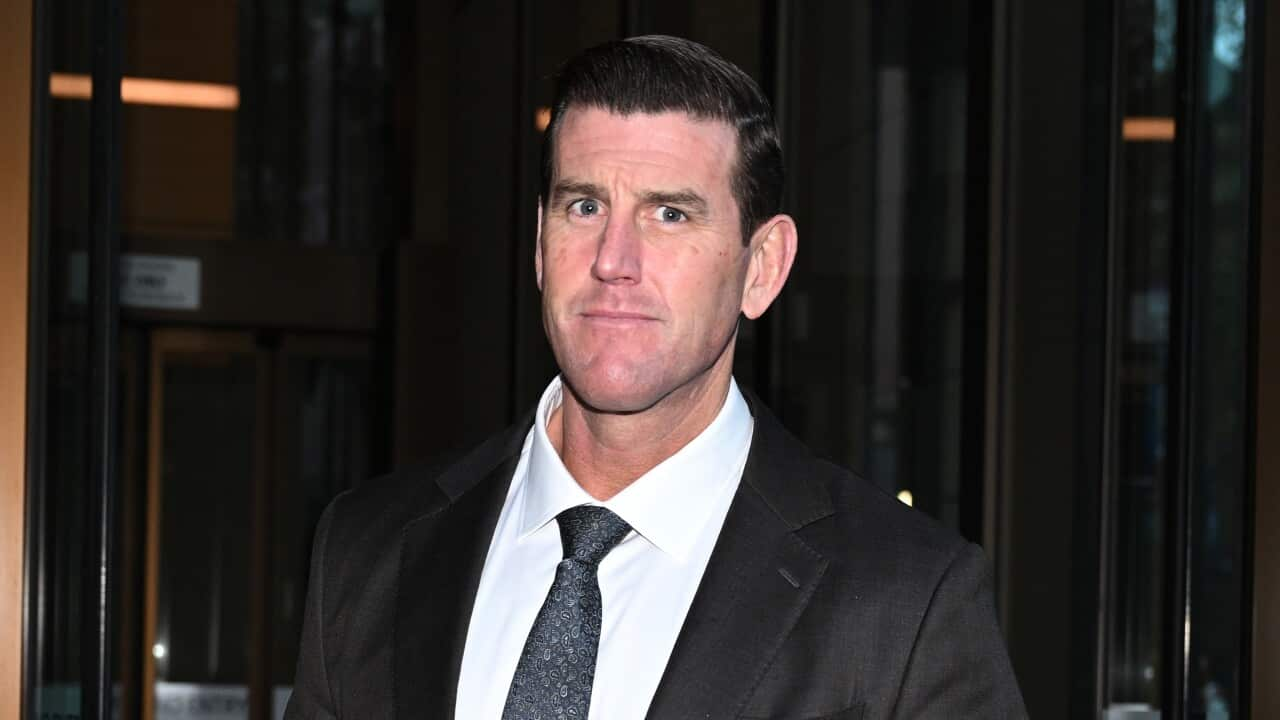

6 min read
This article is more than 1 year old
Exclusive
This is what the Taliban says on allowing Australian war crime investigators into Afghanistan
The Taliban claims it could allow Australian investigators into Afghanistan as part of a war crimes probe - on one condition. But human rights lawyers have criticised the group, which is itself accused of war crimes in the war-torn country.
Published 4 June 2023 6:23pm
Updated 5 June 2023 12:14pm
By Abdullah Alikhil, Lucy Murray, Finn McHugh
Source: SBS News
Image: A senior Taliban official says the group may allow Australian authorities into Afghanistan to investigate war crimes allegations.
KEY POINTS:
- The Taliban says it could allow Australian investigators of alleged war crimes into Afghanistan.
- The Office of the Special Investigator is looking into roughly 40 war crimes allegations.
- But an Afghan-born activist says compensating victims would make them a Taliban target.
The Taliban says it is prepared to facilitate Australian law enforcement investigating war crimes in Afghanistan, provided it believes the probe was "honest".
The hardline militant group, itself under international investigation for war crimes and crimes against humanity, also claims it would ensure.
But an Afghan-born lawyer and human rights activist warns paying compensation would make victims primary targets of the "" - referring to the Taliban - and instead is urging the Albanese government to bring victims to Australia.
The Office of the Special Investigator (OSI) and the Australian Federal Police (AFP) are investigating linked to Afghanistan, though the OSI has warned that Taliban rule meant investigations on the ground were not possible.
Now, a senior Taliban official has told SBS News and SBS Pashto the group could allow Australian investigators access to the country.
The OSI has kept details on its ongoing probes tightly guarded.
But Taliban spokesman Zabihullah Mujahid insisted Australian authorities would need to explain who was under investigation before access was granted.
"If the Islamic Emirate believe that the investigating body is investigating the crimes with honesty, then they would consider assisting the investigation. But we don’t have the trust yet," he said, speaking in Pashto to SBS radio Pashto program.
The Taliban refers to itself as the Islamic Emirate of Afghanistan.
"After we agree and our government departments are aware of it, we will facilitate the team of investigations," Mujahid added.
Taliban reacts to Ben Roberts-Smith defamation trial judgement
The 2020 Brereton report found committed by Australian special forces (SAS) in Afghanistan — allegations revived by a Federal Court defamation ruling last week that news articles claiming Victoria Cross recipient Ben Roberts-Smith had murdered unarmed civilians were substantially true.
Mujahid said the regime had "observed the case" but labelled the Ben Roberts-Smith judgement "symbolic".
He said the incidents were about more than "only one soldier".
"If this act is for justice and to investigate the crimes that get exposed, and also will let people know about it, that it is a good act," he said.
Investigations in Afghanistan 'difficult but possible'
The Brereton report did not name any Australian soldiers as suspected war criminals, though the Nine newspapers have reported Mr Roberts-Smith is one of three former special forces officers under OSI investigation.
Rawan Arraf, Australian Centre for International Justice executive director and principal lawyer, said access to potential crime scenes was difficult even before the Taliban swept to power.
“Looking into incidents which occurred decades ago is always a complication … [but] there are other ways investigators get a better picture,” she said.

Rawan Arraf says war crimes investigations are 'difficult' but not impossible. Source: AAP / Defence
But without a clear indication on access, she said any criminal probe was likely to heavily rely on witness testimony from "courageous" former special forces.
“We [also] know that in some of these particular incidents you had video footage … and at least in the Ben Roberts-Smith defamation trial, we saw really compelling evidence from Afghan witnesses,” she said.
“It is difficult, but I think it's possible.”
The OSI told SBS News it does not comment on operational matters. A Defence spokesperson said the department supported the OSI's investigation, which they stressed was independent.
Compensation could make victims 'Taliban target'
The Brereton report recommended compensation for Afghan victims without waiting for criminal liability to be established, something the Australian government is yet to act on.
That process has been complicated by the Taliban's return to power, though Mujahid claimed the group would ensure Australian compensation reached Afghan victims.
"The team which gives the compensation could go to Uruzgan Province directly, and we will keep their security," he said, referring to the Afghan province in which Australian troops were based.

Sydney-based lawyer and human rights activist Arezo Zoe Safi warns it is too dangerous to compensate alleged war crimes victims at the moment.
"We're now being run by a terrorist organisation ... They will locate these families. They will know that there's financial compensation. They'll come looking for them, kill them, persecute them, and obtain those monies," she told SBS News.
Ms Safi urged the federal government to instead offer victims' families a route to Australia via its humanitarian program.
"That's probably the best it can do for these families who will be primary targets," she said.
Ms Arraf said there had been “deafening silence” from Defence over compensation, which she stressed did not necessarily have to be monetary.
“There might be other kinds of remedies and reparations that the victims might need … one way is through memorialisation of incidents of events that occurred,” she said.
“There are other forms of reparations available to victims there, and they need to be consulted on what it is that they would prefer.”
The Taliban is itself under investigation by the International Criminal Court (ICC) for war crimes and crimes against humanity, a probe which is also looking into claims against former Afghan government officials and foreign forces.
But the ICC announced last year it would prioritise allegations against the Taliban, which include unlawful killings, enforced disappearances and other serious abuses - particularly targeting women, former government officials, and journalists.
Mujahid stopped short of committing to cooperating with international investigations, which he suggested could be part of a "conspiracy ... to favour a particular side".
Members of the Australian Defence Force can access the Defence All-hours Support Line on 1800 628 036 or Open Arms provides free and confidential counselling and support for current and former serving ADF members and their families on 1800 011 046.

